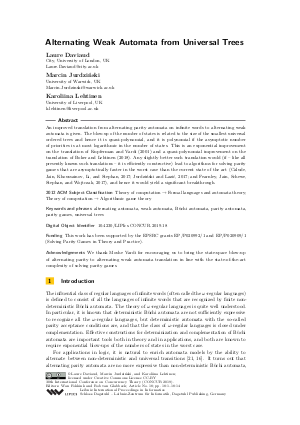@InProceedings{daviaud_et_al:LIPIcs.CONCUR.2019.18,
author = {Daviaud, Laure and Jurdzi\'{n}ski, Marcin and Lehtinen, Karoliina},
title = {{Alternating Weak Automata from Universal Trees}},
booktitle = {30th International Conference on Concurrency Theory (CONCUR 2019)},
pages = {18:1--18:14},
series = {Leibniz International Proceedings in Informatics (LIPIcs)},
ISBN = {978-3-95977-121-4},
ISSN = {1868-8969},
year = {2019},
volume = {140},
editor = {Fokkink, Wan and van Glabbeek, Rob},
publisher = {Schloss Dagstuhl -- Leibniz-Zentrum f{\"u}r Informatik},
address = {Dagstuhl, Germany},
URL = {https://drops.dagstuhl.de/entities/document/10.4230/LIPIcs.CONCUR.2019.18},
URN = {urn:nbn:de:0030-drops-109208},
doi = {10.4230/LIPIcs.CONCUR.2019.18},
annote = {Keywords: alternating automata, weak automata, B\"{u}chi automata, parity automata, parity games, universal trees}
}

 Creative Commons Attribution 3.0 Unported license
Creative Commons Attribution 3.0 Unported license























